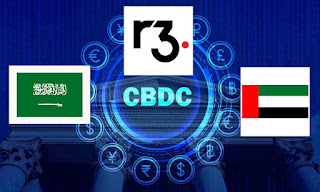Central Bank of Saudi Arabia and UAE choose R3 Corda for CBDC sandbox pilots
During Corda Day
Middle East held on May 11th 2023 in Dubai UAE, speakers from the
Central Bank of Saudi Arabia (SAMA) as well as the Central Bank of UAE
discussed their CBDC strategies and pilots. Both Central Banks are working with
R3 Corda on their CBDC pilot programs, SAMA in its sandbox and UAE Central Bank
in their research and development center.
The event as per
R3, brought together financial service leaders, technologists and Corda
enthusiasts from around the region and the globe. Of the prominent speakers
included H.E. Saif Humaid Hamad Al Dhaheri, Assistant Governor - Strategy,
Financial Infrastructure and Digital Transformation, Central Bank of UAE and
Mr. Mohsen AlZahrani, Virtual Assets (VA) and CBDC program Lead, Saudi Central
Bank – SAMA as well as Richard G Brown, Chief Technology Officer, R3.
Al Dhaheri made
a keynote address on “Future of Money, CBDC and the Digital Dirham” while
AlZahrani carried out the closing Keynote, on the topic of “Wholesale CBDC”
Mohsin
AlZahrani told Lara on the Block, “Currently we are working with R3 Corda only
for the sandbox experimentation, we have not yet decided on the next phase
platform or implementation.”
Farhan Khan, Chief
Technology Officer Consultant and advisor in Fintech and Blockchain, who attended
the event representing Cykube, spoke to Lara on the Block explaining what he
learned about CBDC implementation in UAE and KSA.
Khan explained, “It
was an excellent event and very eye opening on how R3 is properly working in
the region. What I learned about the CBDC implementation in KSA and UAE is that
both are working with R3 but each country has a different approach. Saudi
Arabia is working on a wholesale CBDC project for its domestic payment system,
while UAE Central Bank is working
on CBDC for cross border payments.”
Khan adds, “For
example the ABER cross border payment project which was paused might be
reutilized in the future as per AlZahrani’s statements at the event. AlZahrani
stated that SAMA is utilizing the experience of ABER during the implementation
of the CBDC wholesale payment system concept, and there is a chance in the
future to use ABER again between KSA and UAE after the experimentation of CBDC
wholesale in KSA is completed.”
According to
Khan the UAE is working on a prototype with R3 Corda for the digital dirham
which is currently under testing in their R&D facility.
Khan concludes
to Lara on the Block saying that R3 Corda has seen a lot of interest because it
has very powerful features such as interoperability between blockchain
platforms even public ones. He explains, “Fintech entities in both Saudi Arabi
and UAE are waiting for the network gates to open, and with the VARA crypto
regulations cooking every day we feel the same will be happening in KSA. Corda
is the right framework from a technology perspective with its tremendous
security, protection, especially when it comes to digitization and
tokenization.”
This is
reflected in a
post by R3’s Chief Technology Officer Richard Brown who states, “Composability
and interoperability are critical cogs in the architecture of Corda. With the
next generation of Corda, there’s no need to decide on your network model at
the outset of a project. Start with a centralized, private network and
gradually decentralize over time!”
Brown
believes that the success of Corda is because it is a cross-firm shared
ledger enabling collaborating parties to transact based on high quality data,
without exposing internal data or systems, and with far fewer reconciliation
errors. A ledger that could even become the industry’s system of record for
some key questions such as ownership of assets (the terms ‘Digital Assets’ and
‘Tokenization’
It is also a permissioning
system that provides high identity assurance and gives confidence to regulated
entities that they can comply with their legal obligations to know with whom
they are transacting. In addition is a privacy-first design, allowing competitors to
trade without revealing sensitive data publicly – only participants in a
transaction get to see the details – unlike other blockchain-inspired
approaches.
He even goes so
far to say that, “We’ve been delighted by how successful Corda has been, far
beyond the narrow banking scenarios we originally designed it for. Broadly
speaking, we’re seeing it being used to solve four main problems in ‘Regulated
DeFi’:”


If you would like to support LaraontheBlock blog and are happy with the content being published you can do so by donating USDT . Thank you!
ReplyDeleteUSDT ( ERC20) on the below wallet address:
0x78d6F0a4F22A5D2c7B4e25FEE5fe3a8c1A863820